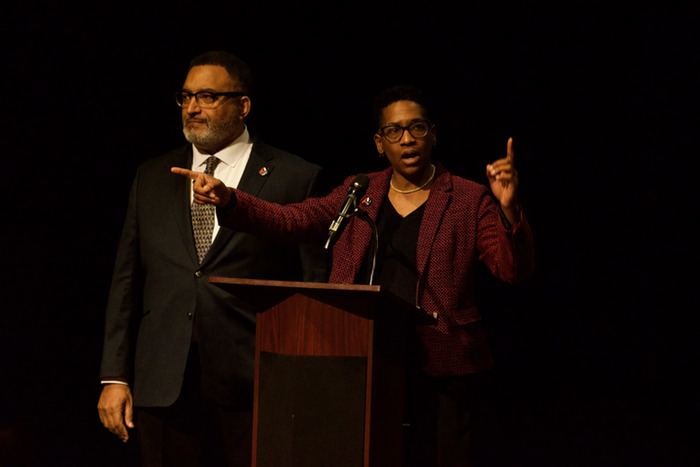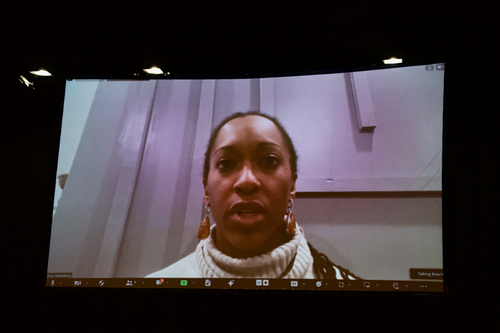
Assembly for the Arts [Assembly] held its quarterly State of the Arts meeting at Karamu House, where it presented the findings on the Support for Independent Artists report it commissioned. The crowded meeting was attended mainly by non-profit executives and employees. The process revealed deeply rooted structural issues compounded by the unresolved harm Cuyahoga Arts and Culture (CAC) has done to the arts community and the artists, including disrespect, exploitation and erasure of artists’ work and voices.
In August 2023, Assembly hired ISO Arts Consulting to facilitate listening sessions with Cleveland artists as part of the 2023 Support for Artists: Community Engagement and Planning Grant. The objective was to provide the Assembly and Cuyahoga Arts and Culture with recommendations to support individual artists in Cuyahoga County. The Assembly wanted input on how to spend its $400,000 Support for Artists grant money.
The room was silent as Brea M. Heidelberg, Principal/CEO of ISO Arts Consulting, rattled off her findings from her office in Philadelphia via a Zoom presentation.

Words like “mischaracterize,” “misrepresentation,” “harm,” “anger,” “frustration,” “hurt,” “co-opted and exploited,” “disrespect,” “deep distrust,” “exploitation,” and “erasure of artist work and voices” flooded the report. Those in attendance sighed under their breaths as the litany of complaints continued. CAC executive director Jill Paulsen and other CAC staff members sat in silence and did not respond.
Dr. Heidelberg said that ISO Arts Consulting created a listening session protocol designed to learn about the lived experiences of being an artist in Cuyahoga County.
“Artists expressed frustration with never knowing what happens with the information they share,” she said. “Some genuinely think that this process is pointless because there is no indication that the outcomes will be different.”
“It is imperative that CAC explicitly acknowledge and apologize for the strained relationship between the organization and local artists,” Dr. Heidelberg continued, “the arts community needs this to see a clear path toward repair and reconciliation if it is to heal. If CAC will not do this, then the rest of the recommendations in this report are rendered useless,” adding, “CAC’s continued silence on past actions and engagement is further eroding artist and community trust in the organization and anything it is associated with.”
CoolCleveland asked County Executive Chris Ronayne before the meeting if he had read the report and to provide comments. Kelly Woodard, Director of the Department of Communications, Office of County Executive Chris Ronayne, provided a statement:
“The Ronayne Administration believes in a healthy arts and culture funding ecosystem that champions our creative community. Cuyahoga County must have a cultural landscape that supports diverse artistic endeavors, as their success is critical to our economy and quality of life. Through dialogue and collaboration, we can secure a future for the arts community that benefits all of our residents. We look forward to the action steps and progress that come from the Assembly for the Arts report.”
CoolCleveland also contacted Jennifer Coleman, Program Director, Creative Culture and Arts, The George Gund Foundation, for a statement. The Gund Foundation provided a $30,000 grant for the study. CAC added another $20,000.
“We understand the survey and listening sessions Assembly for the Arts conducted regarding Cuyahoga Arts and Culture’s support for individual artists will culminate in a series of recommendations to be presented at the December 13th CAC meeting,” said Coleman in a written statement. “The George Gund Foundation looks forward to the presentation and hearing about CAC’s plan going forward.”
At the close of her presentation, Dr. Heidelberg said the overarching recommendation called for more consistency, openness, and transparency as the vital parts of work ahead for CAC. Failing that, reconciliation is not possible.
During the Q&A, CoolCleveland asked Assembly President/CEOJeremy Johnson who will provide the apology to the community recommended by the ISO report, what the apology will include, and when the community can expect to hear it.
“I cannot speak about where they will come from,” said Deidre McPherson, Chief Community Officer at Assembly. “We are partners in this work with CAC, and the arts ecosystem cannot be siloed between institutions, individual artists, and non-profit institutions.”
Johnson added, “CAC are our partners in this, and we have shared our report. They have public meetings where they discuss this under the sunlight law, and we know this will likely be open to discussion with them. We cannot speak for CAC. I do not want to presume how they will respond to that call for an apology, but we can all look forward to hearing from them.”
Late last month, Paulsen said she is taking action from what was heard in Assembly’s artist listening project and, on December 13, will recommend that its board approve a $400,000 grant to Assembly to design and manage the Support for Artist program next year. She did not indicate whether the initiative is a one-time-only action or will continue beyond 2024, nor did she offer a timeline for an apology to the community.
In an article published by Ideastream following the Assembly meeting, Paulsen responded to the criticism by saying, “A lot of the frustrations that we hear routinely come at us because we’re a public entity, and that’s our job—to listen. But they’re the frustrations they have with private philanthropy, with individual donors, with foundations of all types, and just frankly, being in this market where it’s hard to be creative.”

Bruce Checefsky is a filmmaker and photographer, and published writer. He is the recipient of three Ohio Arts Council Individual Excellence Awards, a Creative Workforce Fellowship, and four CEC ArtsLink Fellowships.
One Response to “Report Shows Arts Community Feeling “Disrespect, Exploitation and Erasure””
Liz Maugans’
The CAC Board Meeting is Wednesday December 13 at 3:30 at Cleveland Public Library downtown.